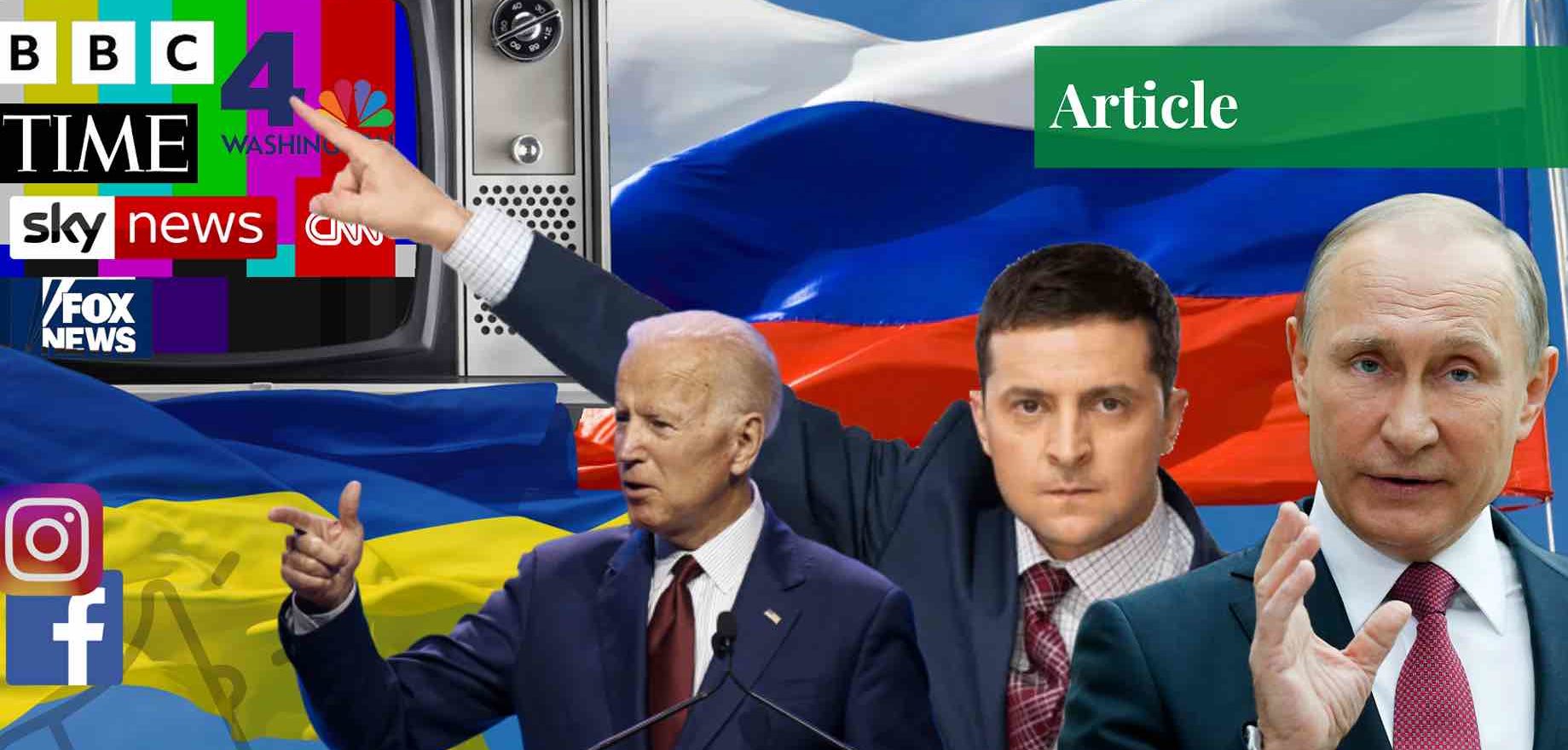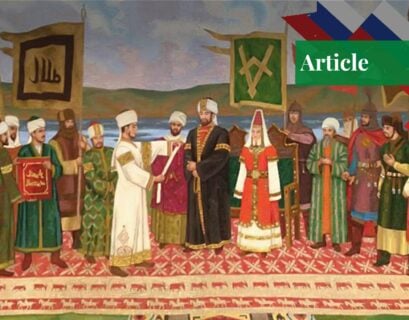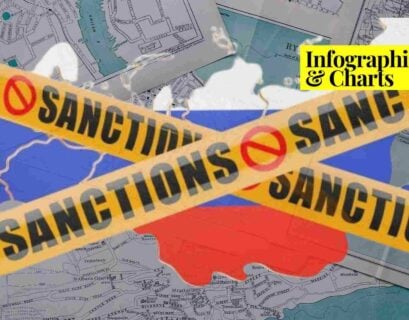Sarmad Ishfaq is an independent researcher and writer whose work has been published by Harvard Kennedy School Review, The Diplomat, Open Democracy, Paradigm Shift, Mondoweiss, and Eurasia Review to name a few. He has also been published by several international peer-reviewed journals such as Taylor and Francis' Social Identities. Before becoming an independent writer, he worked as a research fellow for the Lahore Center for Peace Research. He has a master's degree in International Relations from the University of Wollongong in Dubai where he was recognized as the 'Top Graduate'.
Western Branding: “Ukraine is Good & Russia is Evil”
When asked in an interview about the West’s coverage of the Russia-Ukraine war, legendary journalist and filmmaker John Pilger remarked, “Well I’ve spent my career working in the mainstream, and I’ve covered probably seven, eight, nine shooting wars. I’ve never seen coverage so utterly consumed by a tsunami of jingoism”. Even before the Ukraine crisis, the West’s propagandists were busy fashioning a vitriolic anti-Russia and anti-Putin narrative that obfuscated the complete picture.
Where the West cast Russia as the villain in the story, Ukraine was and is being sold as a mythical champion of democracy and civil liberties. For example, Fox News contributor and former CIA station chief, Dan Hoffman, asserted, “What scares Vladimir Putin at the heart of this conflict is democracy. It’s not that NATO represents a threat…. Putin couldn’t stomach a democracy on his border…”.
The truth however is otherwise. Ted Galen Carpenter, a senior fellow at CATO Institute, notes, “Ukraine is far from being a democratic‐capitalist model and an irresistible magnet for Russia’s groaning masses.” In fact, Ukraine is one of the most corrupt nations in the world and the second most corrupt in Europe behind Russia ironically.
Transparency International’s Corruption Perceptions Index 2021 gave Ukraine a 32 and Russia a 29 (out of 100 where 100 is the least corrupt). Ukraine also, akin to Russia, has a poor track record vis-à-vis civil liberties and democracy. Freedom House gave a 39 out of 100 on their democracy index (100 being the highest) labeling it as a “Transitional or Hybrid Regime”.
The True Picture
Unfortunately, despite being admonished by Human Rights Watch, Amnesty International, and others for harassing political dissidents, barring foreign journalists, censorship measures under Zelensky, war crimes in the Donbas, and not disbanding the neo-Nazi Azov Battalion, Ukraine has been whitewashed of these sins by the West.
Steve Sweeney, an international editor for Morning Star remarked “You have the Times, the Telegraph, the Guardian, the BBC, Sky News, Channel 4 all really producing identical reports…that don’t deviate at all from the government line, from the NATO line…”. In other words, Russia, while nowhere near perfect and in many ways much worse than Ukraine, is being singled out as the coming of the anti-Christ.
The media has also been admonishing Russian war crimes in Ukraine and while this seems to be a good thing on paper, let us dig a bit deeper. To be clear, I am not arguing that Russia has not committed any war crimes in Ukraine (which there is a lot of proof of), but I find it highly implausible that there have been no war crimes via Ukrainian hands (which must be investigated as well).
In fact, when deliberating war crimes vis-à-vis the two belligerents, the mainstream media has blatantly failed to enlighten people about Ukrainian war crimes in the Donbas since 2014 – which precipitated Putin’s invasion. There is more than enough proof that Ukraine has ignominious neo-Nazi elements in its military, namely the Azov regiment, which has committed various war crimes, but the West turns a blind eye to this.
A 2016 report by the United Nations Office of the High Commissioner for Human Rights (OCHA) stated that the Azov looted civilian properties as well tortured and raped detainees in the Donbas. However, America and Europe have snubbed these facts and have instead touted ad nauseam how pro-Russian separatists and Russians have committed war crimes in the country – which is true but again reflects the schism in painting a complete picture.
It is pertinent to remember that one can condemn the Russian war and even applaud Ukraine’s military resistance without fostering a fake image of Ukraine.
Western Sanctions on Russia
The media began touting how Russia’s economy would freefall into oblivion due to the unprecedented Western sanctions. In March, most Western anchors and commentators deliberated that Russia would not be able to withstand such an economic onslaught. For example, this article by the Atlantic stated, “This is terra incognita for economic policy. No country has ever faced this kind of global freeze-out” – and that Russia’s economy will collapse.
I cannot completely fault the likes of Bloomberg, CNBC, CBS, Washington Post, NY Times, etcetera as the sanctions were indeed unprecedented and did massively affect the ruble initially, but their revulsion of Russia and Putin perhaps blinded them so much that they could not even conceive that Russia might have planned this far ahead in the Ukraine crisis. I say the preceding because after that nascent economic drop, Russia’s economy soared and continues to do the same presently.
The US and Europe-led sanctions include but are not limited to freezing Russian central bank assets, phasing out Russian hydrocarbon imports, banning other Russian imports, revoking SWIFT privileges, etcetera. A plethora of businesses such as McDonald’s ceased operations in Russia due to which the country has witnessed an epic withdrawal of FDI.
While this preliminary shudder was difficult to withstand as no country, no matter how strong, is inviolate, the Kremlin responded sagaciously and maneuvered the Russian economy to safety, albeit artificially in many ways. The media then reported that Europe phasing out Russian oil and gas is the worst outcome for Russia.
However, the operative phrase was “phase out” – the implication being that since many European countries including regional powerhouse Germany are so dependent on Russian fuel, these countries could not out rightly repudiate Russian hydrocarbons. Leveraging this hydrocarbon dependency and hold over Europe, Russia demanded that all payments for its oil and gas be made in rubles.
The Rumbling Ruble
Countries like Poland and Bulgaria who refused to pay in the currency were punished as their hydrocarbon flow was halted. Russia not only realized that Europe would be unable to find a tenable source of oil and gas for years but also retaliated against Western sanctions by barring exports of 200 Russian products including agriculture and electrical equipment.
Moreover, the Kremlin relied on reducing the prices of its fossil fuels to seduce allies and energy-voracious nations such as China and India. Both these nations not only refrained from condemning Russia internationally but also bought Russian hydrocarbons worth a staggering $24 billion in only 3 months. Russia earned $13 billion in extra revenue compared to the same months in 2021.
Owing to these factors, the rising global fuel prices, and Russia’s aggressive policy to keep money inside its borders, the ruble soared to its highest levels since May 2015 near the end of June 2022. The ruble has been trading around 50-60 to the dollar which is a far cry from its plunge to 139 to the dollar in March when the US and EU sanctions first propagated.
Surprisingly, the ruble is currently the strongest currency in the world and Putin lauded this success while denigrating the West: “The idea was clear: crush the Russian economy violently,” the Russian president stated. “They did not succeed. Obviously, that didn’t happen.” Perhaps Putin is as calculating as the West has said for years – if so maybe the West should have listened to its own analysis of the Russian president.
Lastly, the war has had an adverse effect on the Euro and the currency has hit parity with the US dollar – a first in 20 years. In other words, this is the Euro’s lowest point in 20 years and Europe might be looking at an incoming recession – especially owing to fears that Russian hydrocarbon flow will be disrupted or halted in the harsh upcoming winter.
The War in Ukraine
The war erupted on 24 February and since then, the world has witnessed a barrage of Western propaganda. While admittedly the Ukrainians fought bravely and defended their land with pride, the mainstream media omitted many facts and primarily showcased Russian humiliations and/or Ukrainian triumphs. By banning RT’s TV channel, YouTube page, and even its website, Europe pushed its West-approved version to the masses.
The initial embarrassment Russia experienced in taking Kyiv saw the talking heads vociferously advocate that Russia had already lost. For example, Sky News host Andrew Bolt brazenly stated, not even a month after the invasion, that the crisis in Ukraine will be Putin’s “Vietnam War”; he also stated that “Vladimir Putin now knows – actually knows – he has lost this war in Ukraine”. The world was told to be in awe of Ukrainians and there was an air of hope that a much smaller fighting force could defeat Russia.
Then came the plethora of reports by perhaps all major Western media outlets that Putin is seriously ill and that he might die soon – this was reported without any solid evidence. Russian troops retreated from Kyiv Oblast on 3 April after their initial failure. The focus then became the Donbas region, which includes Luhansk and Donetsk – both of which have a high Russian-speaking populace and have witnessed a civil war between pro-Russian separatists and Ukraine since 2014.
This military re-orientation was aligned with Putin’s goals to “protect” the Russian-speaking populace in the Donbas. Since the Donbas borders Russia, Putin’s military was bolstered logistically. Moreover, the pro-Russian militias, namely the Donetsk People’s Militia and Luhansk People’s Militia, who have been fighting the Ukrainians for years, augmented the Russian army’s invasion.
On 18 May, the Russian forces took Mariupol in the Donbas before capturing Sievierodonetsk and Lysychansk on 25 June and 3 July respectively, marking two huge victories for Putin. Currently, around 20-22% of Ukraine is in Russian hands including the entirety of Luhansk and around half of Donetsk. When the Ukrainians retreated from Lysychansk to the Donestk province, the Ukrainians claimed it as a “strategic withdrawal” and the media ran with this narrative too in an attempt to save face.
Only in recent weeks has some of the mainstream media succumbed to reality and has begun testifying that Russia has made significant gains. Currently, the media has been backed into a corner as experts and think tanks are touting that Russia is dominating. The Royal United Services Institute (RUSI), for example, warns that the conflict has become a war of attrition that Russia will win. It also says that the Ukrainians currently just do not have enough trained soldiers and armored operators to launch an effective counteroffensive.
A retired Lt. Colonel in the US Army, Daniel Davis, mirrors this sentiment and asserts that it is time to take off the rose-colored glasses and “acknowledge the cold, hard truth: the Russians are on course to win”. Ukraine’s land forces command logistics commander, Brigadier General Volodymyr Karpenko, admitted that the country had lost around 50% of its pre-war stocks of heavy weapons – this includes the loss of 1,300 infantry fighting vehicles, 400 tanks, and 700 artillery systems.
One of Zelensky’s closest advisers, David Arakhamia, who leads Ukraine’s negotiations with Russia admitted that a staggering 1000 Ukrainian soldiers were being killed or wounded each day in the Donbas. A former advisor to US Secretary of Defense, Colonel Douglas Macgregor, highlighted to Sky News that Ukrainians faced heavy losses and around 80% of their fighting force had been neutralized.
The Russians conversely, he stated, are resting and refitting 70-80% of their main force, and most of the fighting is being done by Chechen troops, pro-Russia militias, and mercenaries backed by Russian artillery. What of the weapons that the Western governments and media constantly branded as game changers? “If every heavy weapon committed to Ukraine by the West were delivered immediately, it would not represent one-tenth of the UAF [Ukrainian Armed Forces] losses”.
Furthermore, to operate specialized equipment, one needs specially trained personnel, which the Ukrainians do not have the luxury of right now. Currently, the Russian air force and artillery are operating with near impunity. This is unsurprising as Russia has a 20-1 advantage over its adversary in artillery, a daily air sortie rate of around 300 to five, and a 40-1 advantage in artillery and rocket ammunition.
Conclusion
The Western governments and their indefatigable agents of propaganda have not wasted a single breath in corrupting the information surrounding the war. Whether this was in the form of constructing a narrative that economic sanctions will be catastrophic for Russia, that Ukrainians are saviors of democracy who are dominating the conflict, or the Russians are committing war crimes with liberty, the bias has been deafening.
The Ukraine crisis has exposed the almost perennial myopia of the Western governments and media towards Putin where only Russian atrocities and failures are highlighted but anything Ukrainian is either a masterstroke in military strategy or saintly conduct. Furthermore, the optimism shared by the West regarding Ukraine’s fighting capabilities has romanticized that Ukraine can achieve victory. This has, in turn, endangered the Ukrainians more so.
Lt Col Daniel Davis very astutely states that “The longer we [the West] traffic in the fiction that Ukraine still has a chance, the more Ukrainian civilians will be killed, the more cities will be destroyed…”. Therefore, the American-Euro governments and media are ironically enabling Ukrainian loss of life and infrastructure. In conclusion, the war in Ukraine is not just a physical war but also an informational one.
It is an exposé of the corrupt powers that shape our discourse through government officials and media anchors. It is a great example of how they fashion a good versus evil dichotomy around the globe and decide who falls under the labels of “good” and “evil”. This is quite indignant, but whether you love them, hate them, or are indifferent, the Russians have exposed this propaganda.
One must never forget that these same Western governments and their controlled media conglomerates were apathetic in reporting American and NATO war crimes, among other things, in Iraq and Afghanistan, where hundreds of thousands of innocent Muslims were murdered but never missed an opportunity to characterize Islam as malevolent and Muslims as fanatics.
If you want to submit your articles and/or research papers, please check the Submissions page.
The views and opinions expressed in this article/paper are the author’s own and do not necessarily reflect the editorial position of Paradigm Shift.




















